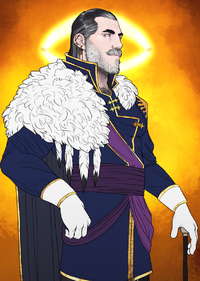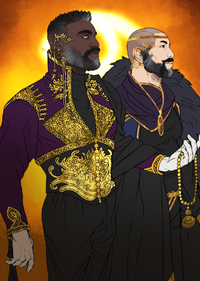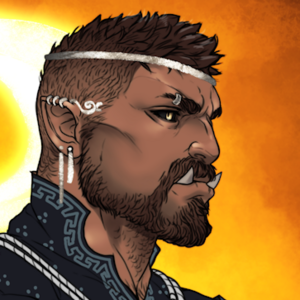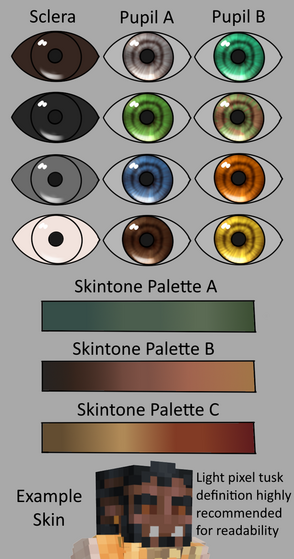Test1: Difference between revisions
No edit summary |
No edit summary |
||
| (90 intermediate revisions by 2 users not shown) | |||
| Line 1: | Line 1: | ||
{ | ==Single Column Format (Gods)== | ||
| | {| class="wikitable" style="margin:left; width: 100%" | ||
| | |- style="background:#AAAAFF" | ||
| | | || | ||
|- | |||
| style="width: 1%" | [[File:Cedragoin.png|180px|caption|]] || | |||
'''Regulus is the God-King, who stands for preserving life and ridding the corrupted, and against idleness and inactive centrism.''' | |||
| | * Regulus is the one true leader of Dragons, the one who makes final decisions and governs the Pantheon. He is seen as a mediator figure. | ||
| | * Regulus lived as a mortal Prince for decades before discovering his Dragonblood. He is considered young and temperamental by his fellow Dragons. | ||
* Regulus is joyous, loud, and a joker. He tries not to take anything too seriously, and thinks being dour all the time is bad for you. | |||
* Regulus is associated with the [[Anglian]] Culture, who his previous incarnation favored greatly. | |||
* Regulus is associated with aesthetics of lightning, the weather, rain, and thunderstorms, which he controls the presence of. | |||
* Regulus is associated with birds, who are considered his watchful eyes in the world. | |||
|- | |||
| colspan="2" | | |||
<span class="mw-customtoggle-Regulus" style="color:#0645AD; font-size:125%"><u>'''[Click to show/hide expanded lore.]'''</u></span> | |||
<div class="mw-collapsible mw-collapsed" id="mw-customcollapsible-Regulus"> | |||
<div class="mw-collapsible-content"> | |||
'''Description'''<br> | |||
Regulus is a complicated Dragon for a variety of reasons. As a recently awoken Dragonsoul from a mortal host, Regulus has lived both the life of a mortal Ailor, and now an immortal Dragon. Equally, this Dragon is meant to be the conclave leader and mediator who keeps peace between Dragons who are likely to feud both over their territory, and ideologies. This contrast between a mortal life and an immortal one has brought both great progress through revolutionizing the way Dragons have thought about the way the world works, but also great chaos. The old Regulus harkens to tales of regalness, composure, and sagely words. The modern iteration is often seen as a capricious clown who somehow stumbles into making the right decision by accident while obfuscating everyone with nonsense words, or unpredictable outbursts of bad temper. Despite all of this, Regulus is credited with having returned nearly all the Dragons to material reality with his Draconic allies, including the help of Regalia's Dragon Cult. While he makes many missteps on the way to progress, he is still seen as the one true leader of the Draconic conclave, especially because he was once a mortal, which brings in a unique perspective that the other often detached or haughty Dragons are unable to empathize with. In he many tangible interactions Regulus has had with mortals in Regalia and beyond, he perhaps imparts one of the most important lessons of all, in that the faithful shouldn't take themselves, their task, or any obstacles they face too seriously, and that people can legitimately die from lack of laughter and joy or loneliness. | |||
'''Virtues'''<br> | |||
Regulus imparts the most important virtue among all the Draconists, which has remained unchanged between his reincarnations, which is the preservation of life. To all Draconists, preserving life and fighting for the preservation of life in small or big ways is always a virtue. This can include being a nurse or doctor, fighting to protect the innocent and weakened who could otherwise not stand up to defend themselves, or ridding the world of particularly corrupted and evil persons and beings who cause death beyond what natural causes have been ordained by Umbra. | |||
'''Vices'''<br> | |||
The greatest vice that Regulus preaches against, is idleness and inactive centrism. Due to Regulus rather fence-hopping attitude towards problems in the past, the concept of enlightened centrism had become a virtue among the Draconists. Ambition and drive to make the world a better place is anemic to centrism however, because institutionalized systems of abuse and loss become impossible to fight if those that should fight try to play the middle-ground. Regulus stands for true moderation and mediation, not passivity in the face of turmoil or trouble. | |||
'''Association'''<br> | |||
Regulus as a past incarnation and present, has a strong association with the Anglian-Ailor people in the Regalian Archipelago. His domain has historically been the whole Archipelago, and as a Dragon, Regulus controls the weather around the world, bringing forth rain and thunder, and heralding the change of the seasons and temperatures. It is by his personal involvement that Anglia when it was settled by the Aml Tribes developed a pleasant and mild climate with fertile soil which was perfect for farming. As such, many also see him as a patron of those that produce food and work with plants. | |||
</div> | |||
</div> | |||
|} | |||
== | ==Double Column Format (Gods)== | ||
<table style="width: 100%;"><tr><td style="width: 50%; vertical-align: top; text-align: left;"> | |||
{| class="wikitable" style="margin:left; width: 100%" | |||
|- style="background:#FFD700" | |||
| || | |||
|- | |||
| style="width: 1%" | [[File:Alexander.png|200px|caption|]] || '''Regulus is the God-King, who stands for preserving life and ridding the corrupted, and against idleness and inactive centrism.''' | |||
* Regulus is the one true leader of Dragons, the one who makes final decisions and governs the Pantheon. He is seen as a mediator figure. | |||
* Regulus lived as a mortal Prince for decades before discovering his Dragonblood. He is considered young and temperamental by his fellow Dragons. | |||
* Regulus is joyous, loud, and a joker. He tries not to take anything too seriously, and thinks being dour all the time is bad for you. | |||
* Regulus is associated with the [[Anglian]] Culture, who his previous incarnation favored greatly. | |||
* Regulus is associated with aesthetics of lightning, the weather, rain, and thunderstorms, which he controls the presence of. | |||
* Regulus is associated with birds, who are considered his watchful eyes in the world. | |||
|- | |||
| colspan="2" | | |||
<span class="mw-customtoggle-Everwatcher" style="color:#0645AD"><u>For expanded lore, click here.</u></span> | |||
<div class="mw-collapsible mw-collapsed" id="mw-customcollapsible-Everwatcher"> | |||
<div class="mw-collapsible-content"> | |||
'''Description'''<br> | |||
The Everwatcher (not pictured) is the Supreme Being of Unionism, the source of all creation, and the final destiny of all things. Unionists believe it was the first thing created at the beginning of time, holding supremacy over all other Gods and Goddesses. The Everwatcher does not manifest in Aloria, and utilizes the Vessel-God to be the living embodiment of its divine will. Alexander is the Emperor of Regalia, and is thus the current Vessel-God of Unionism until his death or abdication (as only the reigning Emperor can be the Vessel-God). Together, Alexander and the Everwatcher represent Divinity, Sageness, Wisdom, Benevolence, Inclusivity, All-Loving, and All-Caring. The Imperial Palace is seen as the chief holy place for the Vessel God, and seen as the holiest site for Unionists. There are no Rituals for the Vessel God, as they are only divine in life, and each successor takes a different approach to carrying out the Everwatcher's will, making it difficult to find any common rituals beyond the imperial coronation and other ceremonies of state. | |||
'''Virtues'''<br> | |||
The Virtue of the Vessel is to be humble and aware of one's own mortality. Nobody lives forever, as even the Vessel God will one day die, so Unionists make an effort to use what time they have to celebrate their achievements and gains in life, while also preparing the way for their inevitable successors. Likewise, Unionists in positions of authority are tasked with being fair representatives of the Emperor's positive characteristics, as the Emperor in turn is representative of the Everwatcher's divinity. By being a fair and just example, Unionists demonstrate the benevolence of the Vessel-God, which helps to encourage even non-believers to emulate his characteristics to benefit the Regalian Empire and further the Great Way. | |||
'''Vices'''<br> | |||
The greatest Vice against the Vessel God is pride itself, and the refusal to prepare the stage for one's inevitable successor. The only way for a society to continue to improve is when one's forebears adequately prepare the next generation with the tools needed to carry on the torch of leadership. To deny and obstruct the transfer of power when the time comes not only causes the creation of incompetent leaders, but also creates cults of personality which detract from the needs of the greater Unionist community. As such, Unionists are obliged to make arrangements to ensure that stability is maintained, so that their deaths do not lead to a power vacuum or future incompetence. Likewise, the faithful should be willing to forfeit their power to another if it benefits the Great Way. | |||
'''Legacy'''<br> | |||
Alexander was born Alexander Kade, son of Arch-Chancellor Moriarty Kade and Princess Alianne Ivrae de Sange, through whom the line of Succession passed through after the death of the previous Emperor, Justinian II. Alexander was brought up to one day succeed his father as Arch-Chancellor, though the Sanction of 302 AC saw him become Emperor instead. Emperor Alexander is actually Alexander II, as the God Brand was known as Alexander the Giant in life. However, the regnal number is often omitted, as Alexander is the first reigning Emperor with that name, and also because Alexander the Giant is referred to by his divine name Brand since his death. Emperor Alexander is the only mortal to have become the Vessel-God twice, as he abdicated the throne to his brother Cedromar before being reinstated after an interregnum period. Despite the Emperor's absence in recent times, he remains the Vessel-God, as he has not been declared dead, nor has any successor taken the Imperial Throne. | |||
</div> | |||
</div> | |||
|} | |||
</td><td style="vertical-align: top; width: 50%;"> | |||
{| class="wikitable" style="margin:left; width: 100%" | |||
|- style="background:#FFD700" | |||
| || | |||
|- | |||
| style="width: 1%" | [[File:Thomur.png|200px|caption|]] || '''Regulus is the God-King, who stands for preserving life and ridding the corrupted, and against idleness and inactive centrism.''' | |||
* Regulus is the one true leader of Dragons, the one who makes final decisions and governs the Pantheon. He is seen as a mediator figure. | |||
* Regulus lived as a mortal Prince for decades before discovering his Dragonblood. He is considered young and temperamental by his fellow Dragons. | |||
* Regulus is joyous, loud, and a joker. He tries not to take anything too seriously, and thinks being dour all the time is bad for you. | |||
* Regulus is associated with the [[Anglian]] Culture, who his previous incarnation favored greatly. | |||
* Regulus is associated with aesthetics of lightning, the weather, rain, and thunderstorms, which he controls the presence of. | |||
* Regulus is associated with birds, who are considered his watchful eyes in the world. | |||
|- | |||
| colspan="2" | | |||
<span class="mw-customtoggle-Prophets" style="color:#0645AD"><u>For expanded lore, click here.</u></span> | |||
<div class="mw-collapsible mw-collapsed" id="mw-customcollapsible-Prophets"> | |||
<div class="mw-collapsible-content"> | |||
'''Description'''<br> | |||
Theomar (left) and Thedmir (right) are the Prophet Gods of Unionism, the spreaders and founders of the faith. Theomar is also known as the first God-Emperor of Unionism, a title used to refer to the Emperors and Empresses who ascend to godhood after their deaths. In life, Theomar was the first Vessel-God of Unionism, making him the first physical speaker of the Everwatcher, and thus was responsible for proclaiming the message of Unionism through the Creed. Thedmir was a God of the Guided Unionists, but following the mending of this community with the rest of the Unionists, was included as the Duo-God with Theomar, as Thedmir was equally responsible with spreading the faith of Unionism during its beginning. Together, the Prophet Gods represent insight, good governance, loyalty, friendship, and faith. They are often represented by the necklace of friendship, as the bond between friends is the same type of bond that should be shared between all Unionists. Their main place of worship is the All-Beacon Temple in the center of the City of Regalia, which is the tallest temple in Unionism. Rituals of the Prophets include the preaching of Unionism to non-believers, aiding in the defense of holy places, mediating disputes between adversaries, and providing spiritual guidance to the military. There are also rituals concerning the sanctification and re-affirmation of friendship. | |||
'''Virtues'''<br> | |||
The Virtue of the Prophets is to be faithful, which is practiced in a multitude of ways. First, the act of preaching and spreading the faith is an act to honor the Prophets, as well as ensuring the safety of all Unionist holy places to ensure the faithful can worship freely. Secondly, faith is practiced by supporting the Regalian Empire. As the State Religion, Unionism expects that its practitioners are good citizens, from the lowest commoner working an honest job, to the highest Duke governing fairly as a representative of the Emperor. Finally, the Virtue of Faith is expressed as friendship, or faith in one another, as only through shared bonds and experiences can the Great Way be progressed. | |||
'''Vices'''<br> | |||
The greatest Vice against the Prophets is to turn away from the Great Way, or to impede it. The most obvious example of such sabotage is treason against the Regalian Empire. As the State Religion, Unionism and Regalia are treated as one and the same in the hearts of Unionists, meaning that to harm the State by cooperating or aiding foreign adversaries is considered both a secular and religious crime. Likewise, the hindering of missionaries is likewise seen as a sin against the Prophets' message. As a tenet of Unionism is loyalty to the Regalian Emperor, spreading the faith to foreign nations is often a first step in incorporating them into the Empire's territory or network of alliances. Preventing the spread of Unionism to these states makes future diplomatic missions far more difficult, which can lead to setbacks in the Empire's ambitions. | |||
'''Legacy'''<br> | |||
In life, Theomar was known as Thulric Ivraan, later known as Theomar Ivrae, the First Emperor of Regalia. It was Theomar who received visions from the Everwatcher which led to the proclamation of Unionism via the Creed, and set the foundations for the religion. Theomar was the Vessel-God, and was considered to be a mortal God. Following his death, the Covenant Council confirmed his ascension to the Pantheon, maintaining the same divinity he held in life. Thedmir was known in life as Thedmir Kade, Grand Alder of Anglia and first Arch-Chancellor of the Regalian Empire. As a lifelong friend of Theomar, Thedmir co-led the Five Family Rebellion which established the Regalian Empire, before working on laying out the government structure alongside the Emperor. When Theomar recieved his visions, Thedmir became the first convert to Unionism, and aided in its spread among the ruling nobility of the Empire. Following his death, Thedmir was not immediately seen as a God, though the Guided Unionists would deify him centuries later to be a Duo-God with Theomar, a status which eventually was adopted by all Unionisms following the mending of the schisms. | |||
</div> | |||
</div> | |||
|} | |||
</center> | |||
</tr></table> | |||
==At First Glance (Heritage Header)== | |||
<table style="width: 100%;"><tr><td style="width: 80%; vertical-align: top; text-align: left; "> | |||
{| style="margin:left; width: 100%; font-size:120%" | |||
|- style="background:#4A8757" | |||
| | |||
|- | |||
| Eronidas are proud, warlike, and poetic. These Orc-inspired, widespread people live just about everywhere. With a knack for warfare anyone can appreciate, they are well-received both in Regalia, which they helped found, and abroad. The Eronidas have a danger-filled history fleeing their lost home continent and invading the Allorn Empire, holding on until that Empire's collapse, and then charting their own course in the world. An honor-obsessed Heritage who are friends or enemies for life, the Eronidas are well-represented in the religions Draconism and Unionism, and a good pick for any soldier Character. More information below. | |||
|} | |||
==Design== | |||
{{TOC left}} | |||
The Eronidas are Aloria’s interpretation of the typical fantasy Orc but with a much broader cultural approach. Broadly speaking, Eronidas can appear like the typical Orc with green skin, large tusks, and a brutish appearance, but there is far greater visual diversity. Some Eronidas can appear more ogre-like in their features and bodily proportions, while others can appear much closer to Ailor, with their only distinguishable features being their tusks. This section will explain the design themes of the various sub-groups of Eronidas, but it is important to stress that they are guidelines and not strict rules. Outliers to each design style exist, and experimentation with design is encouraged to fit something for you. While it is hard to properly categorize Eronidas society into exact sub-groups due to their varied societies, for ease of reference, there exist three dominant aesthetics, Kissut, Ahazu, and Zabar. Next to the text explanations are also a variety of images that explain aesthetics. | |||
===Kissut Eronidas=== | |||
The Kissut Eronidas are most commonly found in Regalia, with a particular spread in the landmass of [[Anglia]] and Regalia itself. Kissut Eronidas are culturally the same as Regalian Ailor, they have inter-mingled with their society to such a degree that they dress, behave, and act the same way as the common population of the Empire, though not without bringing their own flair and style to [[Ailor Culture]]. Kissut Eronidas are predominantly [[Unionist]], with a smaller grouping in [[Draconism]]. They have a strong connection with the founding of the Regalian Empire, and the [[Anglian]] Ailor people who they share the land with. Kissut Eronidas can also be found in the unique nation of Ashaven, which has a large Eronidas population and a distinctly unique culture that is different from Anglian Eronidas. | |||
* ''For more on Anglian-Eronidas relations, read [[Eronidas-Anglian_Relations|this Expanded Lore]]'' | |||
* ''For more on Eronidas role in Regalian History, read [[Regalian_Eronidas_History|this Expanded Lore]]'' | |||
* ''For more on the Eronidas settlement of Ashaven, read [[Eronidas_Ashaven|this Expanded Lore]]'' | |||
===Ahazu Eronidas=== | |||
Ahazu Eronidas are less commonly found in Regalia, as they are mostly mountainous and freedom-seeking people who don’t function well under hierarchical authorities where they cannot compete over power with raw strength. The Ahazu are a hardy people with a more brutish and ogre-like appearance, who have adapted to near-constant warfare and harsh conditions of their independent mountain cities in North-West Daen. The Ahazu Eronidas are almost exclusively Draconism worshipers and were largely responsible for the intense conflicts with the Elves over the centuries. The Ahazu also man the last City of the Living in the Beyond Realm, fighting back against the Ordial monsters. | |||
* ''For more on Eronidas-Elven Wars, read [[Eronidas_Elven_Wars|this Expanded Lore]]'' | |||
* ''For more on the Last City of the Living, read [[Last_City_of_the_Living|this Expanded Lore]]'' | |||
===Zabar Eronidas=== | |||
Zabar Eronidas sit somewhere in between the Kissut and Ahazu, predominantly having been a mass exodus from [[Guldar]] to [[Daen]] and lands beyond. The Zabar hold onto their old pre-exodus culture and are thus more bound to traditions and customs than the Regalian-adapted Kissut, or the Ahazu who have mostly shed their old culture to create a new one in the east. Zabar Eronidas build massive city-states, impressive multi-ringed cities where their warrior-poets ply equal trade in art and warfare, defending their independent states, or semi-autonomy in other countries. Zabar Eronidas are predominantly Draconism worshipers, though effectively every other Religion can be found among them. | |||
* ''For more on the Eronidas Exodus, read [[Eronidas_Exodus|this Expanded Lore]]'' | |||
* ''For more on Eronidas City States, read [[Eronidas_City_States|this Expanded Lore]]'' | |||
</td><td style="vertical-align: top; width: 20%;"> | |||
{{Info Lineage | |||
|name = Eronidas | |||
|test = Eronidas (in Vasar), Enid (in Vaman) | |||
|test2 = [[File:Eronidasflag.png|80px]] | |||
|test3 = '''No spear unbroken!''' | |||
|image = 2eef97f4949d8bfa55f8ee790c439cb1.png | |||
|suzerain = [[Regalian Empire]], Eronidas Realms | |||
|religion = [[Draconism]], [[Unionism]] | |||
|demonym = Eronidas | |||
|}} | |||
[[File:Racecolorpalette.png|294px|thumb|right|This sheet shows the lore-compliant eye colors (and their differing shades) and skin-tones for the Eronidas people, along with an example skin. You may be able to find free skins on Planet Minecraft under search term "MassiveLooks".]] | |||
</td></tr></table> | |||
Latest revision as of 20:57, 12 June 2024
Single Column Format (Gods)
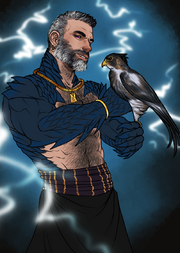 |
Regulus is the God-King, who stands for preserving life and ridding the corrupted, and against idleness and inactive centrism.
|
|
[Click to show/hide expanded lore.] Description Virtues Vices Association | |
Double Column Format (Gods)
|
| ||||||||||||
At First Glance (Heritage Header)
DesignThe Eronidas are Aloria’s interpretation of the typical fantasy Orc but with a much broader cultural approach. Broadly speaking, Eronidas can appear like the typical Orc with green skin, large tusks, and a brutish appearance, but there is far greater visual diversity. Some Eronidas can appear more ogre-like in their features and bodily proportions, while others can appear much closer to Ailor, with their only distinguishable features being their tusks. This section will explain the design themes of the various sub-groups of Eronidas, but it is important to stress that they are guidelines and not strict rules. Outliers to each design style exist, and experimentation with design is encouraged to fit something for you. While it is hard to properly categorize Eronidas society into exact sub-groups due to their varied societies, for ease of reference, there exist three dominant aesthetics, Kissut, Ahazu, and Zabar. Next to the text explanations are also a variety of images that explain aesthetics. Kissut EronidasThe Kissut Eronidas are most commonly found in Regalia, with a particular spread in the landmass of Anglia and Regalia itself. Kissut Eronidas are culturally the same as Regalian Ailor, they have inter-mingled with their society to such a degree that they dress, behave, and act the same way as the common population of the Empire, though not without bringing their own flair and style to Ailor Culture. Kissut Eronidas are predominantly Unionist, with a smaller grouping in Draconism. They have a strong connection with the founding of the Regalian Empire, and the Anglian Ailor people who they share the land with. Kissut Eronidas can also be found in the unique nation of Ashaven, which has a large Eronidas population and a distinctly unique culture that is different from Anglian Eronidas.
Ahazu EronidasAhazu Eronidas are less commonly found in Regalia, as they are mostly mountainous and freedom-seeking people who don’t function well under hierarchical authorities where they cannot compete over power with raw strength. The Ahazu are a hardy people with a more brutish and ogre-like appearance, who have adapted to near-constant warfare and harsh conditions of their independent mountain cities in North-West Daen. The Ahazu Eronidas are almost exclusively Draconism worshipers and were largely responsible for the intense conflicts with the Elves over the centuries. The Ahazu also man the last City of the Living in the Beyond Realm, fighting back against the Ordial monsters.
Zabar EronidasZabar Eronidas sit somewhere in between the Kissut and Ahazu, predominantly having been a mass exodus from Guldar to Daen and lands beyond. The Zabar hold onto their old pre-exodus culture and are thus more bound to traditions and customs than the Regalian-adapted Kissut, or the Ahazu who have mostly shed their old culture to create a new one in the east. Zabar Eronidas build massive city-states, impressive multi-ringed cities where their warrior-poets ply equal trade in art and warfare, defending their independent states, or semi-autonomy in other countries. Zabar Eronidas are predominantly Draconism worshipers, though effectively every other Religion can be found among them.
|
| ||||||||||||||||||
